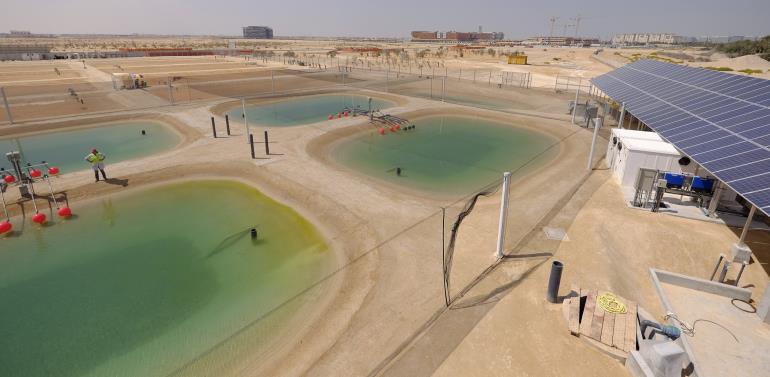GCC
UAE central to global movement to simultaneously harvest both food and feedstock for bioenergy

Today, the UAE imports roughly 90 per cent of its food – at a cost, that if left unchecked, is predicted to increase 300 per cent over the next decade. But the challenge of food security is also an unprecedented opportunity to advance ideas and innovations that are both sustainable and economically viable. The Masdar Institute, along with its partners, is doing just that.
“Energy, water and food security are key, interlinked needs for the UAE. Masdar Institute is committed to supporting the country’s strategic goals, and we are proud to be operating this research facility, which not only develops sustainable bioenergy and food to help fuel and diversify the UAE economy, but also serves as a training ground for a new generation of innovators,” said Dr. Behjat Al Yousuf, interim provost of Masdar Institute, a graduate research-based university in Abu Dhabi, and a founding member of the SBRC.
“This project reinforces Masdar City’s burgeoning ecosystem of innovation and strengthens its collaborative links between industry, academia and government,” said Dr Al Yousuf, “the cutting-edge bioenergy facility also provides an example of how collaboration produces real and valuable outcomes, and will thus inspire and attract further research to Abu Dhabi.”
Aquaculture – industrial fish or shellfish farming – is one of the world’s fastest expanding food sectors, with a current growth rate of about 6 per cent a year. While aquaculture systems can reduce a nation’s dependence on foreign food and improve security, they pose environmental challenges due to the impact of nutrient-rich effluents flowing into the ocean. The SBRC tackles these concerns and is seeking to minimize the footprint of commercial farming practices.
“Aquaculture systems are here to stay,” said Dr. Kevin Fitzsimmons, professor of environmental science at the University of Arizona and a globally recognized expert on aquaculture systems. “As the planet’s population approaches 9 billion people, we must advance technologies that enable sustainable and manageable food production. The innovative facility in Abu Dhabi is a showcase of how cross-sector cooperation can lead to breakthrough research with the potential to deliver both food and aviation fuel – and do so in a sustainable, scalable way,” he added.
The research facility uses coastal seawater to raise fish and shrimp for food, whose nutrient-rich wastewater then fertilizes plants rich in oils that can be harvested for aviation biofuel production. The salt-tolerant halophyte plants – whose commercial potential is relatively unexplored – thrive in arid, desert conditions and don’t require fresh water or arable land to grow. In the last step of the system, wastewater is diverted into a cultivated mangrove forest, further removing nutrients and providing valuable carbon storage, before the naturally filtered and treated effluent is discharged back into the sea.
“As the global community moves toward global targets to reduce emissions, aviation too is doing its part and making great progress. Sustainable aviation biofuel is poised to play an important role in meeting the aggressive emission reduction goals industry has set,” said Marc Allen, president, Boeing International. “We’re proud to be a part of the Abu Dhabi consortium establishing this new biofuel research facility. It shows real promise to transform coastal deserts into productive farmland supporting food security and cleaner skies,” he added.
Masdar Institute, together with Etihad Airways, Boeing and Honeywell UOP, were the founding members of SBRC. TAKREER, the Abu Dhabi oil refining company, along with Safran and GE Aviation, have since joined the research group.
-

 News2 months ago
News2 months agoAI Security Conference 2025 Hosted by Securado Highlights the Changing Cybersecurity Landscape
-

 Insurance2 months ago
Insurance2 months agoSupporting Community Wellness: Liva Insurance Sponsors Muscat Marathon 2026 with Free Health Checkups
-

 Interviews1 month ago
Interviews1 month agoEXCLUSIVE INTERVIEW: TLS Rebranding Marks Strategic Leap Toward Innovation, Sustainability & Growth
-

 Insurance1 month ago
Insurance1 month agoLiva Insurance Supports Community Wellness Through “Experience Oman – Muscat Marathon 2026”
-

 Dossier7 days ago
Dossier7 days agoDossier, 2026
-

 Investment3 weeks ago
Investment3 weeks agoLalan Inaugurates Its First Overseas Manufacturing Facility, Marking Sri Lanka’s First Investment in SOHAR Freezone
-

 Banking & Finance1 week ago
Banking & Finance1 week agoNational Finance Unveils Exclusive Ramadan Offers on Auto Financing
-

 Food & Dining3 weeks ago
Food & Dining3 weeks agoGrand Millennium Muscat’s exclusive Ramadan Iftar and Suhoor Experiences





























You must be logged in to post a comment Login